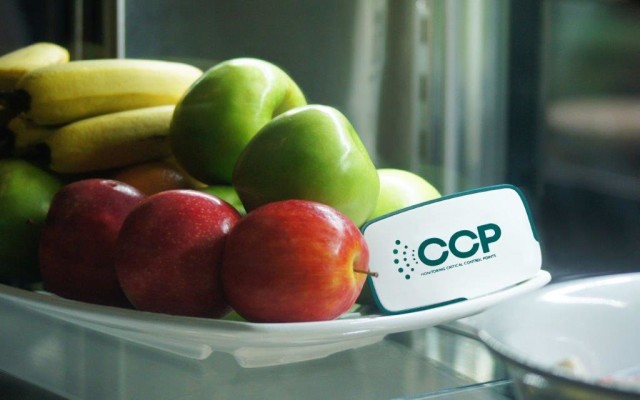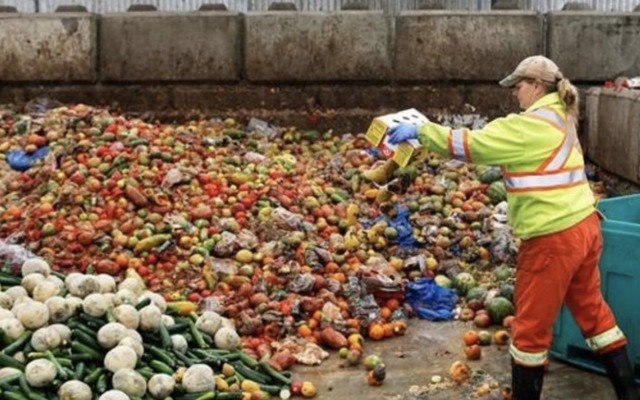CCP Technologies harnesses the Internet of Things to help solve US$1.2 trillion global food wastage crisis

As much as 1.6 billion tonnes of food, 33% of all food produced globally, is wasted each year.
It is said that necessity is the mother of all invention.
Within the realm of supply chain management, there is a growing need for businesses to monitor how their goods are being shipped worldwide – especially perishable food that typically require stringent oversight and quality control.
The pressing need for better monitoring has brought forward several tech-based solutions that attempt to resolve the issues caused by poor supply chain management, or rather, mismanagement.
CCP Technologies (ASX: CT1) has developed a smart sensor, or “tag”, that can track and record a variety of environmental factors that allow perishable food to remain commercially-viable and thereby prevent huge amounts of food wastage – currently a huge issue that is threatening food security on a global scale.
Critical control points
According to CCP Technologies, its mission to help solve the worsening food crisis is based on proactive management of “critical control points” – a term used to describe crucial factors that their solution continuously monitors for both fixed location and shipment applications.
Critical control points are environmental conditions and processes within a supply chain where a failure has the potential to cause serious harm to people and a business’ continuity.
The caveats that are critical to record and monitor throughout the lifetime of a product’s journey from supplier to customer can include movement, temperature, energy consumption and other environmental conditions such as air and water quality, pH, chemicals, noise, acoustics and gas content.
At present, these conditions are very sparsely monitored with the information not being processed in real-time, but rather, analysed at the end of the journey when the product may have already spoiled or lost its premium market value due to human error during transportation.

For CCP Technologies, supply-chain management represents a business opportunity where the company can supply devices to improve recording and monitoring of perishable goods, made possible by the Internet of Things (IoT).
The IoT has triggered an avalanche of gadgets and applications for consumers and the B2C market. Examples include smartphones and watches, security equipment, smart domestic appliances and even driverless cars are all part and parcel of what’s become known as IoT revolution. There’s no doubt, CCP could also re-purpose its smart sensors for a B2C play.
According to market analysts, such devices will bridge the gap between the physical and digital worlds, to improve the quality and productivity of industry and society as a whole.
One of the most integral areas for both businesses and policymakers is food security.
The need for food security
Food security is currently one of the most pressing issues in the world today.
According to several agencies including the United Nations, the US Department of Agriculture (USDA) and even the New South Wales Government, food waste is creating a multitude of different problems economically, socially and environmentally.
Both richer and poorer countries are just as likely to waste food, with the prime cause being a lack of suitable technology and a very disjointed supply chain that is essentially made up of a collection of individuals, as opposed to a collective working as part of one unified supply chain.
CCP believes the time has come for these problems to become a thing of the past, courtesy of technology that is now able to fill in the information gap that has existed for decades.
In an exclusive interview, executive director and chief executive officer of CCP Technologies, Michael White told Small Caps that “globally, food companies are coming under increasing pressure to reduce food waste. A huge amount of food is wasted through the cold chain due to temperature violations; and people die every day from foodborne illness.”
“To mitigate the risk of refrigeration infrastructure failure in the cold chain, we sell a cost-effective IoT solution to the food industry to continuously monitor temperature and other critical control points.”
“Every day our customers are being alerted to breaches of temperature tolerances; and therefore, reducing food waste. New features we’ve just release provides the business intelligence need to proactively manage refrigeration system on an enterprise scale.”

Currently, 55% of food is wasted each year on a retail level due to temperature violations.
CCP Technologies is bringing the full gamut of tech benefits for supply chain managers, including cutting-edge technologies such as distributed ledgers and blockchain.
“The move to Blockchain is clear. The world’s largest retailer, Walmart, recently announced that by September 2019, it will be mandatory for all suppliers of leafy green vegetables to upload their data on a designated blockchain application. It’s only a matter of time before all perishable foods will go the same way.”
“To promote greater transparency and efficiency including temperature management KPIs in the supply chain, we’ve recently demonstrated our IoT solution integrating with a blockchain application. This positions CCP to support the global perishable food industry move towards smart contracts,” Mr White said.
From problem to solution
The problem of adequately storing and transporting perishable food under optimal environmental conditions has always been a serious food safety hazard. As the demand for perishable food increases, supply chain participants must invest in infrastructure and technology to reduce risk.
People are living longer, and the global population is increasing steadily. By 2050, the world could have a population close to 9 billion which adds further pressure on food producers to create more food and for it to be supplied rapidly and in good condition to its destination.
As much as 1.6 billion tonnes of food (33% of all food produced), valued at US$1.2 trillion, is wasted every year.
Meanwhile, around 870 million globally are classified as chronically undernourished – a rather sobering statistic that underlines the mismanagement of resources plaguing the world.
Population growth coupled with urbanisation and higher incomes is shifting demand-side dynamics with food security quickly becoming a mainstream political issue.
As a result of the growing impact on consumers, boosting food availability through extended shelf life and reducing waste has become a viable commercial niche that is set to create a compelling and substantial market opportunity for CCP Technologies.
According to CCP (and confirmed by a report published by the NSW Government last year), temperature is the most significant factor affecting the shelf life of perishable foods, though for some foods humidity (also monitored by CCP’s solution) is also important. Storing perishable foods consistently within recommended temperature ranges is critical for food safety.
In Australia, an estimated 4.1 million domestically acquired cases of foodborne illness occur every year, costing an estimated $1.2 billion.
The cost of wasted food also impacts the world on a macro scale. The world’s food waste accounts for more greenhouse gas emissions than any country except for China and the US. In its Food Wastage Footprint report, the UN Food and Agriculture Organisation (FAO) estimated that the carbon footprint of wasted food was equivalent to 3.3 billion tonnes of carbon dioxide per year.
Furthermore, research carried out by the USDA revealed wastage rates of 11.4% for fresh fruit, 9.7% for vegetables and 4.5% for meat, poultry and seafood in the US alone – a country considered a global leader in supply-chain management and using infrastructure that it is second to none compared to other nations.
As the population continues rising and the amount of arable land remains constant, food security is becoming a growing threat to society – but a threat that can be mitigated by reducing the amount of food that is wasted unnecessarily.
According to an initial feasibility study addressing food cold chain optimisation prepared by the Australian Alliance for Energy Productivity (A2EP) and published by the NSW Office of Environment and Heritage, a 5% reduction in food waste would result in a $1 billion annual saving in Australia.
The study said that increased deployment of real-time temperature monitoring at the most granular level “presents a significant opportunity to improve food shelf life, quality and revenue, and reduce food waste, waste disposal costs and associated emissions.”
On a global scale, implementing tech-based solutions based on smart gadgets and synchronised supply-chain monitoring could reanimate several billions of dollars currently going to waste – and companies such as CCP Technologies want to be the first to offer the solutions that will make this a reality.
“In a short period of time, CCP has established a solid foundation. We have a patented IoT critical control point monitoring solution being used by an increasing number of food industry customers in Australia and the USA. Our ecosystem is growing, including relationships with global Telco’s and other multi-nationals. We’re now in an enviable position of being able to quickly extend into new business opportunities and other markets, including a managed cold-chain service offering and a potential B2C play which is a massive opportunity,” Mr White said.
